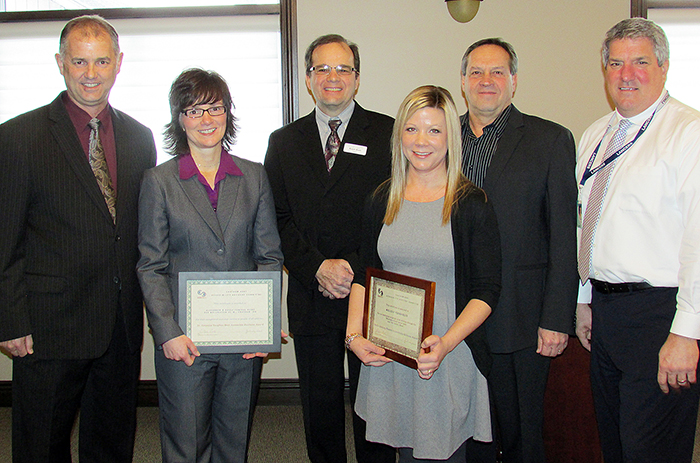
Creating accessible buildings isn’t a case of “making them handicap accessible but making them accessible for all” according to Dan Houle, co-owner of the Alexander Houle Funeral Home.
Houle and his wife Anne were honoured by the Chatham-Kent Accessibility Advisory Committee (AAC) as this year’s winner of the Dr. Veronica Vaughan Most Accessible Business Award for their Wellington Street facility.
Chatham-Kent Councillor Bob Myers, who presented the award, recalled watching the former 19th century Alexander Houle building burn to the ground more than five years ago.
“I wondered if they would rebuild,” he said. “I don’t know if it’s bigger (than the old building) but it’s definitely better.”
Dan said the couple immediately knew what they wanted, but coming up with the plans took a little more doing.
“What you see here is plan 35,” he laughed. “I can honestly say I wouldn’t change a thing. “
He said “making buildings for everyone is just a mindset change.”
The renovated facility is a single floor structure that flows from reception areas through visitation suites, the chapel, and offices without barriers.
More than 90,000 people from the 600 families served have used the facility that will celebrate its fifth anniversary in April.
Receiving the Sheila Lindsey-Powers Accessibility Advocate Award was Melissa Fernandes, a teacher at UCC.
Ray Power, UCC principal, said Fernandes has been an advocate for inclusion for many years.
Fernandes is a founder of the Rhythmic Souls Dancers, an integrated dance team featuring exceptional and non-exceptional members.
“Melissa sees beyond any individual’s shortcomings and recognizes every person’s individual creativity and helps them harness that potential,” Power said.
“Humbled and honoured…and I’m speechless,” Fernandes said. “I just teach.”
Ralph Roels, chair of the AAC, said the awards are in memory of former committee members who showed exceptional dedication.
“Dr. Vaughn suffered from MS (multiple sclerosis) as long as I knew her,” he said. “She made sure her condition didn’t define her in any way.”
“Sheila Lindsey-Powers was deaf and a double amputee who got around with the assistance of her service dog,” he said. “She drove her own vehicle and was a real advocate for individuals’ rights.”





